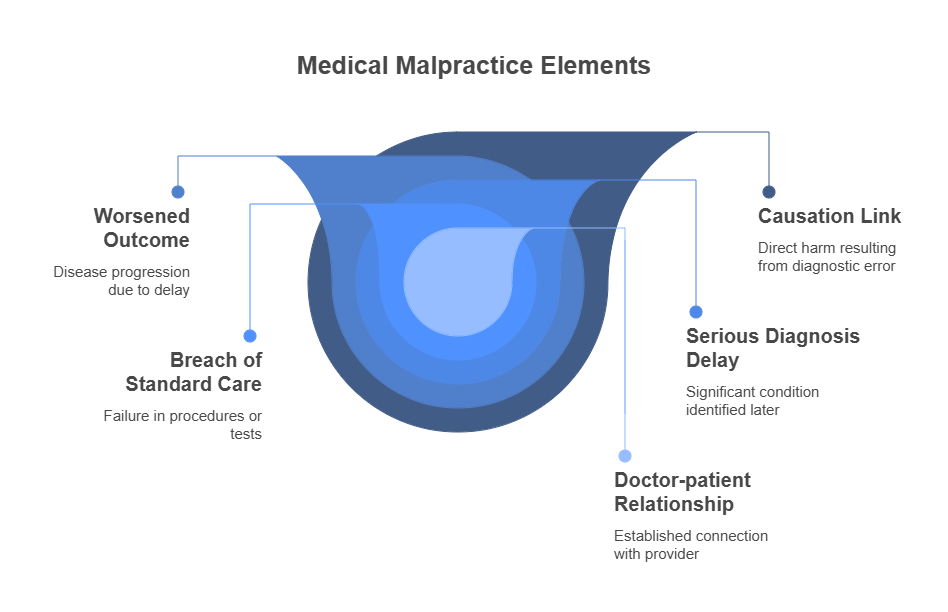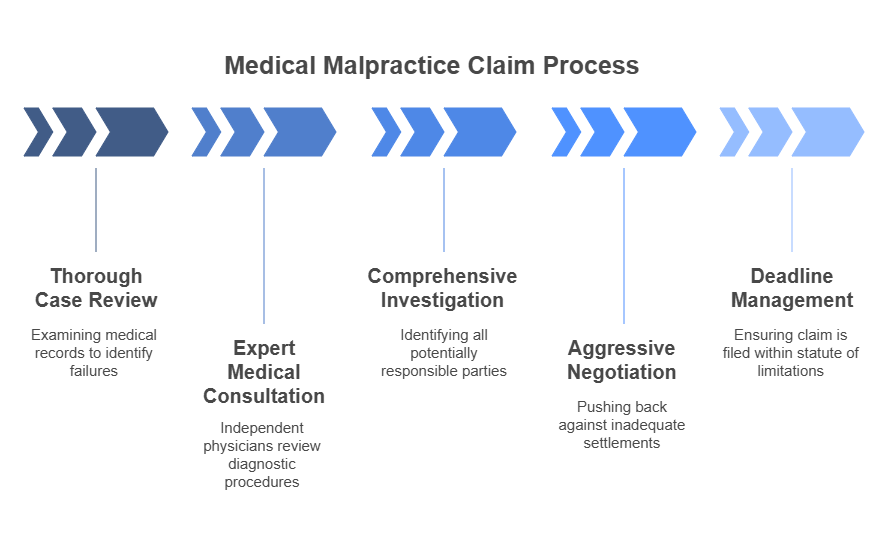When a doctor fails to identify a serious medical condition, the consequences can be devastating. You may have suffered unnecessary pain, undergone more invasive treatment, or lost precious time with your family. At Frank Spector Law, we understand the emotional and physical toll that diagnostic errors take on patients and their loved ones.
Medical providers have a professional duty to properly diagnose your condition based on your symptoms and medical history. When they fail to recognize the signs of cancer, infection, or other serious diseases, their negligence can cause irreversible harm. You deserve answers, and you deserve compensation for the damage their failure has caused.
Frank Spector, our Maryland failure to diagnose lawyer, has recovered millions for clients harmed by delayed diagnosis. Our experience includes significant victories across Maryland’s medical malpractice cases:
- $1,200,000: Stroke misdiagnosis jury verdict in Washington, DC
- $1,000,000: Failure to diagnose case settlement in Harford County
- $1,000,000: Cancer misdiagnosis settlement in Baltimore City
For expert legal guidance on your Maryland failure to diagnose case, call 443-845-1456 to schedule your free consultation. Our experienced team is ready to help you pursue the compensation you deserve.
How to know if you have a failure to diagnose case in Maryland
Several key factors determine whether you have grounds for a medical malpractice lawsuit. Consider these essential elements when evaluating your situation:
- Doctor-patient relationship: You must have had an established relationship with the healthcare provider who failed to diagnose or treat your condition properly.
- Breach of standard care: Your doctor failed to order appropriate tests, ignored symptoms, or didn’t follow proper diagnostic procedures that other competent physicians would have taken.
- Serious diagnosis delay: You were later diagnosed with a significant medical condition that should have been identified earlier through reasonable medical care.
- Worsened outcome: The delayed diagnosis led to disease progression, additional treatment, or complications that could have been prevented with timely identification.
- Causation link: Your harm directly resulted from the diagnostic error, not from the natural progression of your underlying health issue.
💡 Even if your symptoms seemed unclear at the time, most malpractice claims hinge on whether another competent provider would have reached a timely diagnosis under the same conditions. Reviewing each element carefully can reveal whether your situation qualifies.
Additional reading: how to prove a medical malpractice case

What compensation can you claim?
Maryland law allows victims of diagnostic negligence to seek various forms of compensation to help restore their lives and cover ongoing needs:
- Medical expenses: Current and future costs for treatment, surgery, medication, and rehabilitation required due to the delayed diagnosis.
- Lost income: Wages you’ve missed while receiving treatment, plus reduced earning capacity if your condition affects your ability to work long-term.
- Pain and suffering: Physical discomfort, emotional distress, and mental anguish caused by the diagnostic error and resulting complications.
- Loss of enjoyment: Compensation for activities, hobbies, and life experiences you can no longer participate in due to your worsened condition.
- Family impact: Damages for how the diagnostic error has affected your relationships and your family member’s quality of life.
- Wrongful death benefits: If a patient lost a loved one due to failure to diagnose, survivors may recover funeral costs, lost support, and other death-related damages.
How to get in touch with our Maryland delayed diagnosis lawyer
We make it easy for Maryland families to discuss their potential medical malpractice case with our legal team:
- Telephone consultation: Call 443-845-1456 to speak directly with Frank Spector about your situation
- Contact us online: Submit your case details through our secure contact form for a prompt response
Schedule a free consultation to learn how we can help you determine if you have a valid malpractice claim.
Who can be held accountable in a failure to diagnose claim?
Multiple healthcare providers and institutions may bear responsibility when a patient’s medical condition goes undiagnosed. Primary care physicians often serve as the first line of defense against disease, yet they sometimes fail to identify symptoms or order necessary tests.
Emergency room doctors face particular scrutiny when they discharge patients without proper evaluation, especially in cases involving chest pain, severe headaches, or abdominal symptoms that could indicate life-threatening conditions.
Radiologists play a critical role in diagnostic accuracy, as they interpret imaging studies that can reveal cancer, fractures, or other serious issues. When these specialists misread X-rays, CT scans, or MRIs, patients may suffer significant harm from delayed treatment.
⚠️ Many patients overlook how multiple providers—primary doctors, radiologists, and even hospital systems—can all bear legal responsibility when communication lapses or procedural errors delay diagnosis.
Hospital systems themselves can be liable when their policies, staffing decisions, or communication failures contribute to diagnostic errors.
Laboratory technicians and pathologists who mishandle specimens or provide incorrect test results may also face accountability. Additionally, specialist physicians who receive referrals but fail to follow through with appropriate diagnostic procedures can be held responsible for the consequences of their negligent care.
How our Maryland failure to diagnose lawyer can help
Our legal team takes a comprehensive approach to building your medical malpractice case, ensuring every aspect of your claim receives proper attention:
- Thorough case review: We examine your medical records, identify where providers failed to meet professional standards, and help you determine the strength of your claim.
- Expert medical consultation: Independent physicians review your case to confirm whether proper diagnostic procedures were followed and whether earlier detection would have improved your outcome.
- Comprehensive investigation: We identify all potentially responsible parties, including hospitals, doctors, laboratories, and other healthcare providers who may have contributed to the diagnostic delay.
- Aggressive negotiation: Our firm pushes back against insurance companies that offer inadequate settlements, fighting to recover compensation that truly reflects your damages.
- Deadline management: We handle all paperwork and legal requirements to ensure your claim is filed within Maryland’s medical malpractice statute of limitations, protecting your right to seek justice.

Why choose Frank Spector Law as your failure to diagnose attorney in Maryland?
With 30 years of experience helping people manage complex medical malpractice situations, Frank Spector brings unmatched expertise to every client’s case.
Our firm specializes exclusively in medical negligence claims, allowing us to develop deep knowledge of Maryland’s healthcare system and the tactics insurance companies use to minimize settlements.
We understand that every client faces unique challenges after a diagnostic error. Some patients require ongoing treatment for advanced cancer that could have been caught earlier. Others suffer from stroke complications that proper emergency care might have prevented.
✔️ Frank Spector’s decades-long focus on diagnostic malpractice enables clients to work with a team that understands both the clinical complexity and emotional gravity of delayed diagnoses.
Still others have lost family members to conditions that went undiagnosed despite clear warning signs. Our client-centered approach means we take time to understand how the diagnostic failure has affected your life, your family, and your future.
We work on a contingency fee basis, so you pay nothing unless we recover compensation for your case. This arrangement allows you to focus on your health while we handle the legal complexities of proving medical malpractice.
Frank Spector’s professional recognition includes:
- “Superb” rating on Avvo
- Selected to Super Lawyers: 2008 – present
- Verified Justia profile
- Verified D.C. Bar member: 1993 – current
Statute of limitations in Maryland
Maryland law requires medical malpractice lawsuits to be filed within the earlier of five years from when the injury was committed or three years from when the injury was discovered. This makes prompt action essential for protecting your legal rights.
The discovery rule may extend your filing window if the diagnostic error wasn’t immediately apparent. This situation commonly occurs with cancer cases, where patients may not realize a tumor was missed on an earlier scan until months or years later.
However, Maryland also imposes a five-year statute of repose, meaning most claims must be filed within five years of the alleged malpractice, regardless of when the harm was discovered.
Don’t wait to contact our firm about your potential case. Delayed action can weaken your claim as medical records become harder to obtain, witnesses’ memories fade, and essential evidence may be lost.
Healthcare providers regulated by the Maryland Board of Physicians must maintain proper documentation, but accessing these records becomes more challenging over time.
Contact our experienced Maryland medical malpractice lawyer for a free consultation about your medical malpractice claim.
How Maryland’s ‘discovery rule’ applies in failure to diagnose cases
Maryland’s discovery rule recognizes that patients don’t always immediately know they’ve been harmed by medical negligence. In failure to diagnose cases, the statute of limitations may begin when you reasonably should have discovered both the injury and its connection to the provider’s negligence.
This rule particularly benefits cancer patients whose tumors went undetected on imaging studies. If a radiologist missed a small lung nodule that later developed into advanced cancer, the discovery rule might allow you to file suit from when you learned about the missed finding, not from the original scan date.
However, applying this rule requires careful legal analysis of your specific situation and the evidence available in your medical records.

General information on failed diagnoses
✔️ Diagnostic errors represent one of the most common forms of medical malpractice, affecting hundreds of thousands of patients annually across the United States.
These mistakes occur in various healthcare settings, from busy emergency rooms to primary care offices, and can have devastating consequences for patients and their families.
Knowing the different types of diagnostic errors helps patients recognize when they may have grounds for a legal claim. The medical community continues to study these issues through organizations and academic institutions that research improving diagnostic accuracy.
What is considered failure to diagnose?
Failure to diagnose occurs when a healthcare provider completely misses a patient’s condition despite having sufficient information to make the correct diagnosis. This type of error differs from misdiagnosis, where the doctor identifies a condition but gets it wrong, and delayed diagnosis, where the correct diagnosis is eventually made but after unnecessary delay.
For a failure to diagnose case to succeed in court, you must prove that a competent physician in similar circumstances would have identified your condition. The law doesn’t require doctors to be perfect, but it does demand that they meet the standard of care that other reasonable physicians would provide. This standard varies depending on the doctor’s specialty, the healthcare setting, and the information available at the time.
Common conditions providers fail to diagnose
Certain medical conditions are more frequently missed than others, often due to their complex presentation or similarity to less serious illnesses:
- Cancer types: Breast, colon, lung, and prostate cancers are commonly missed, particularly in early stages when symptoms may be subtle or attributed to other causes.
- Cardiovascular emergencies: Heart attacks and strokes can present with atypical symptoms, especially in women, elderly patients, or those with diabetes.
- Serious infections: Sepsis, meningitis, and other life-threatening infections may be dismissed as less serious conditions like flu or gastroenteritis.
- Neurological conditions: Aneurysms, multiple sclerosis, and brain tumors often produce symptoms that can be attributed to stress, headaches, or other common complaints.
- Autoimmune diseases: Conditions like lupus or inflammatory bowel disease may take years to diagnose due to their varied presentations.
- Diabetes complications: Diabetic ketoacidosis and other serious complications may be overlooked in patients without a known diabetes history.
| Condition | Critical Test Often Missed | Potential Complication |
|---|---|---|
| Lung Cancer | Chest CT scan | Metastasis to other organs |
| Stroke | Brain MRI or CT | Permanent paralysis or death |
| Sepsis | Blood culture and lactate | Septic shock and organ failure |
| Heart Attack | Cardiac enzymes and EKG | Sudden cardiac death |
| Appendicitis | CT scan of the abdomen | Rupture and peritonitis |
Examples of diagnostic negligence
Healthcare providers can fail their patients in numerous ways when it comes to proper diagnosis:
- Inadequate testing: Failing to order appropriate blood work, imaging studies, or other diagnostic tests when symptoms warrant investigation
- Misinterpreting results: Incorrectly reading X-rays, lab values, or other test results, or failing to recognize abnormal findings
- Ignoring red flags: Dismissing concerning symptoms or failing to investigate patient complaints that suggest serious underlying conditions
- Poor referral practices: Not consulting specialists when patient conditions exceed the provider’s expertise or require specialized evaluation
- Communication breakdowns: Failing to follow up on test results, not communicating findings to patients, or inadequate information sharing between providers
- Inadequate history-taking: Not gathering sufficient information about patient symptoms, family history, or risk factors that would guide appropriate testing
Signs a delayed diagnosis caused harm
Several indicators suggest that a diagnostic delay worsened your medical outcome and may form the basis for a malpractice claim. Disease progression represents the most obvious sign, particularly when cancer spreads to other organs or infections become systemic.
Patients may require more invasive treatment than would have been necessary with earlier detection, such as major surgery instead of minimally invasive procedures.
The loss of treatment options also indicates harm from delayed diagnosis. Some cancers become inoperable once they reach advanced stages, and certain stroke treatments are only effective within hours of symptom onset.
Additionally, preventable complications that develop during the delay period may cause permanent disability or reduced life expectancy.
If your condition progressed from treatable to terminal during the diagnostic delay, this strongly suggests that the provider’s failure to diagnose caused significant harm. Similarly, if you now face a much more uncertain prognosis than you would have with a timely diagnosis, you may have grounds for a substantial compensation claim.
Free consultation: Speak with our failure to diagnose attorney in Maryland today
Don’t let a healthcare provider’s negligence define your future without fighting for the justice you deserve. At Frank Spector Law, we’ve spent decades helping Maryland families recover from the devastating effects of diagnostic errors, and we’re ready to put that experience to work for your case.
Hypothetical Scenario: A Baltimore patient visits their primary care doctor complaining of a persistent cough and unexplained weight loss. The physician attributes these symptoms to seasonal allergies without ordering a chest X-ray. Six months later, the patient is diagnosed with advanced lung cancer that could have been detected and treated successfully with earlier imaging.
The medical system failed you when it should have protected your health. Our firm will investigate every aspect of your care, consult with leading medical experts, and fight tirelessly to recover the compensation you need to rebuild your life. We handle all legal complexities while you focus on your recovery and your family’s well-being.
Contact our firm today at 443-845-1456 or visit our contact page to schedule your free consultation.

FAQs
Can I afford a malpractice case if I'm already struggling with medical bills?
Yes, we handle medical malpractice cases on a contingency fee basis, meaning you pay nothing unless we recover compensation for you. This arrangement allows you to pursue justice without upfront legal costs while dealing with mounting medical expenses. We advance all case expenses, including expert witness fees and court costs, so financial concerns don't prevent you from seeking accountability.
Do I need to have a second doctor agree that there was a mistake?
While having another physician's opinion can strengthen your case, it's not legally required to file a malpractice claim. Maryland law requires expert medical testimony to prove negligence, but we work with qualified medical experts who review your records independently. These experts help establish whether your original providers met the appropriate standard of care for your situation.
Will my case be public if I sue for medical malpractice?
Court proceedings are generally public record, but many medical malpractice cases settle confidentially before trial. If your case goes to court, some details may become public, though personal medical information is typically protected. We can discuss strategies to maintain privacy while pursuing your claim, including confidentiality agreements when possible during settlement negotiations.
What happens if the hospital won't release my records?
Maryland law gives patients the right to access their medical records, and hospitals cannot legally refuse to provide them. If you encounter resistance, we can formally request your records on your behalf and, if necessary, use legal procedures to compel their release. Healthcare providers who improperly withhold records may face additional legal consequences beyond your malpractice claim.
For more information about what is medical malpractice or what is an example of malpractice vs negligence, explore our comprehensive legal resources. We also handle specific diagnostic failures, including failure to diagnose colon cancer cases throughout Maryland.
